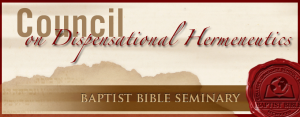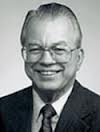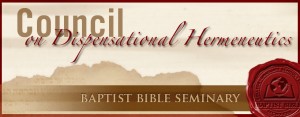We are keeping our eye on the developments of the cornavirus, but at the present time, we are still planning on meeting for our CDH meeting on Sept. 16-17, 2020 at the Crowne Plaza hotel in the Philadelphia area. Below is the “Call for Papers” that was distributed through the Council website. Plan on joining us. If you are a traditional dispensationalist who would like to give a paper, we would love to consider your proposal.
CALL FOR PAPERS
Thirteenth Annual Council on Dispensational Hermeneutics
Crowne Plaza Hotel Conference Center, Claymont, Delaware (Philadelphia Area)
September 16-17, 2020
“Dispensationalism, Politics, and Culture”
This is a call for papers for the 2020 Council on Dispensational Hermeneutics. The Council is an academic study group for traditional dispensationalists although observers from other theological traditions are welcome to attend. This year’s focus is on the dispensational understanding of politics and culture. This is a follow-up to last year’s discussions on social justice and race. If my read on last year’s work is correct, many of us preferred the term biblical justice to social justice. This year we expand our talks at a time when politics and culture appear to be at a boiling point in the United States. Our hope is to bring the Bible to bear on the polarization that confronts all of us. As usual, we desire not simply a theological debate but an attempt to evaluate the hermeneutical and methodological positions involved as we engage in interaction about politics and culture. We want to answer “why” we hold the views we affirm.
We may be asking specific individuals to do various topics as well as receiving your proposals. Off-topic proposals will be considered but those concerning politics and culture will be reviewed first. All proposals with full title and descriptions (not more than 200 words) should be emailed to the Executive Director, Dr. Mike Stallard, at mstallard@foi.org. The deadline for topic proposals to be turned in is June 1, 2020. The entire Steering Committee of the Council will decide collectively which papers are accepted. This process usually does not take long. The deadline for presentation papers to be turned in is September 1, 2020 in order to be posted at the Council website.
This year there is a modest registration fee of $25 for the Council to help cover the costs of the meeting. Registration will be online at the Council website: www.dispensationalcouncil.org. Please make sure to register online as information becomes available if possible. You may also register in person at the conference.
Topics that we are requesting members to consider are the following:
- The contribution of a particular
section or book of the Bible to issues of politics and culture — examples
- Should all Ten Commandments (vertical) be enforced in society today?
- Should only the last six (horizontal) of the Ten Commandments be enforced today?
- Application of the book of Proverbs to issues today
- The contributions of Jesus’ teaching on issues of politics and culture during his earthly ministry
- The contributions of Paul’s teaching on issues of politics and culture in his epistles
- Empire criticism and the book of Revelation
- Is there a form of government that is more biblical than other forms of government? (monarchy, democracy, democratic republicanism, etc.)
- Is there an economic system that is more biblical than other approaches to the economy of a nation or the world (e.g., capitalism, socialism, communism)?
- As a corollary to the previous question, what does the Bible teach about private property?
- What is the biblical role of government? Does this change through the panorama of the ages? Is it different in dispensationalism than in other theological systems?
- What is a biblical approach to understanding and interacting with culture in general?
- Do Niebuhr’s classical categories (Christ and Culture) have validity for our theological thinking today? (Note D. A. Carson’s Christ & Culture Revisited)
- An evaluation of various forms of liberation theology and how culture is impacted by such teachings (e.g., Latin American liberation theology, feminist or womanist theology, black theology, Christian Palestinianism, Jürgen Moltmann, etc.)
- A defense or refutation of just war theory — does dispensationalism differ from other theological systems on this issue? To what extent can dispensationalists embrace pacifism?
- To what extent can a Christian get involved in politics – running for office or working for politicians?
- How should Christians respond to recent advancements of immoral and unethical behavior in society at large (i.e., homosexuality, transgenderism, etc.)?
- What is the relationship of nations today (including the United States) to the kingdom of God?
- Analysis of various views in church history of politics, government, and culture. Some examples would be (1) is postmillennialism given over to the advancement of political means to advance the kingdom?; (2) Christian attempts to bring in the kingdom during the time of the English Civil War (Cromwell, 17th century); (3) Augustine’s City of God; (4) changes brought in by Constantine in the early 4th century, (5) views on social engagement in progressive dispensationalism.
- Does the distinction between Israel and the Church, a doctrine championed by traditional dispensationalism, affect one’s view of how believers interact with politics and culture?
- How does dispensationalism affect one’s view of political engagement on the issue of Zionism and Israel as a nation today?
- An analysis of a specific Christian’s approach to political engagement (John Nelson Darby, Wilbur Wilberforce, Francis Schaeffer, Jerry Falwell, Tim LaHaye, etc.)
- Is there a necessary correlation between liberal theology and liberal politics? Between conservative theology and conservative politics?
Other topics related to the theme are welcome as well. These are suggestions to help us think about the issues.
As always, we will attempt to have an appropriate pastor’s panel to make sure our discussions stay grounded in concern for the local church.
Again, final papers are to be submitted to Dr. Stallard by September 1, 2020 at the email listed earlier. There will be no remuneration for presentation of papers. Council attendees need to provide their own transportation to the Council site. Those who are speaking at the Council must also register for the conference similar to what takes place at the Evangelical Theological Society and the Pre-Trib Study Group.
Information on area hotels will be provided on the Council website. The Crowne Plaza hotel that is hosting the Council this year has some relatively good prices. If you stay there, make sure to tell them you are with our group. The Crowne Plaza is at the corner of Interstate-95 and Highway 92 (address is 630 Naamans Road, Claymont, Delaware). It is about 13 miles southwest of the Philadelphia International Airport, a straight shot down I-95.




